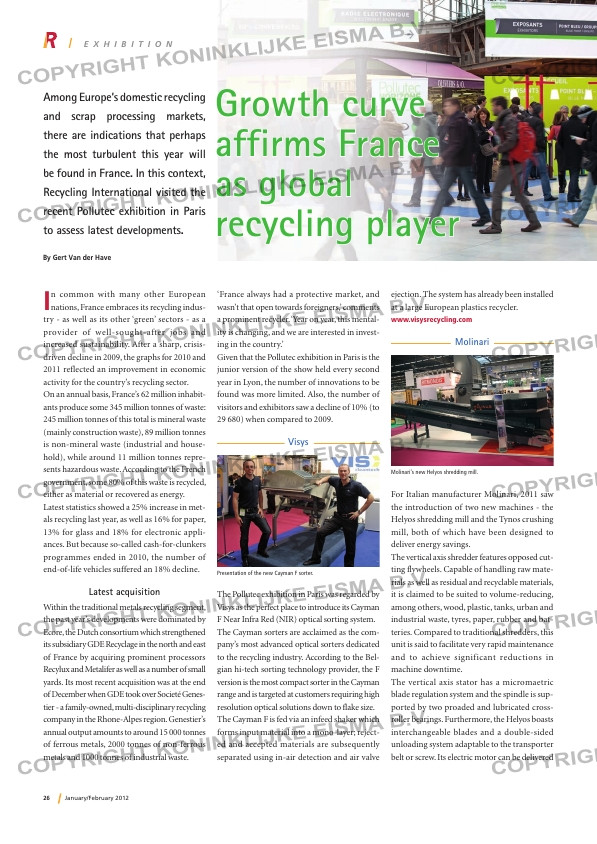Page 26 from: January / February 2012

26 January/February 2012
Among Europe’s domestic recycling
and scrap processing markets,
there are indications that perhaps
the most turbulent this year will
be found in France. In this context,
Recycling International visited the
recent Pollutec exhibition in Paris
to assess latest developments.
In common with many other European nations, France embraces its recycling indus-
try – as well as its other ‘green’ sectors – as a
provider of well-sought-after jobs and
increased sustainability. After a sharp, crisis-
driven decline in 2009, the graphs for 2010 and
2011 reflected an improvement in economic
activity for the country’s recycling sector.
On an annual basis, France’s 62 million inhabit-
ants produce some 345 million tonnes of waste:
245 million tonnes of this total is mineral waste
(mainly construction waste), 89 million tonnes
is non-mineral waste (industrial and house-
hold), while around 11 million tonnes repre-
sents hazardous waste. According to the French
government, some 80% of this waste is recycled,
either as material or recovered as energy.
Latest statistics showed a 25% increase in met-
als recycling last year, as well as 16% for paper,
13% for glass and 18% for electronic appli-
ances. But because so-called cash-for-clunkers
programmes ended in 2010, the number of
end-of-life vehicles suffered an 18% decline.
Latest acquisition
Within the traditional metals recycling segment,
the past year’s developments were dominated by
Ecore, the Dutch consortium which strengthened
its subsidiary GDE Recyclage in the north and east
of France by acquiring prominent processors
Recylux and Metalifer as well as a number of small
yards. Its most recent acquisition was at the end
of December when GDE took over Societé Genes-
tier – a family-owned, multi-disciplinary recycling
company in the Rhone-Alpes region. Genestier’s
annual output amounts to around 15 000 tonnes
of ferrous metals, 2000 tonnes of non-ferrous
metals and 1000 tonnes of industrial waste.
‘France always had a protective market, and
wasn’t that open towards foreigners,’ comments
a prominent recycler. ‘Year on year, this mental-
ity is changing, and we are interested in invest-
ing in the country.’
Given that the Pollutec exhibition in Paris is the
junior version of the show held every second
year in Lyon, the number of innovations to be
found was more limited. Also, the number of
visitors and exhibitors saw a decline of 10% (to
29 680) when compared to 2009.
Visys
The Pollutec exhibition in Paris was regarded by
Visys as the perfect place to introduce its Cayman
F Near Infra Red (NIR) optical sorting system.
The Cayman sorters are acclaimed as the com-
pany’s most advanced optical sorters dedicated
to the recycling industry. According to the Bel-
gian hi-tech sorting technology provider, the F
version is the most compact sorter in the Cayman
range and is targeted at customers requiring high
resolution optical solutions down to flake size.
The Cayman F is fed via an infeed shaker which
forms input material into a mono-layer; reject-
ed and accepted materials are subsequently
separated using in-air detection and air valve
ejection. The system has already been installed
at a large European plastics recycler.
www.visysrecycling.com
Molinari
For Italian manufacturer Molinari, 2011 saw
the introduction of two new machines – the
Helyos shredding mill and the Tynos crushing
mill, both of which have been designed to
deliver energy savings.
The vertical axis shredder features opposed cut-
ting flywheels. Capable of handling raw mate-
rials as well as residual and recyclable materials,
it is claimed to be suited to volume-reducing,
among others, wood, plastic, tanks, urban and
industrial waste, tyres, paper, rubber and bat-
teries. Compared to traditional shredders, this
unit is said to facilitate very rapid maintenance
and to achieve significant reductions in
machine downtime.
The vertical axis stator has a micromaetric
blade regulation system and the spindle is sup-
ported by two proaded and lubricated cross-
roller bearings. Furthermore, the Helyos boasts
interchangeable blades and a double-sided
unloading system adaptable to the transporter
belt or screw. Its electric motor can be delivered
E X H I B I T I O N
By Gert Van der Have
Growth curve
affirms France
as global
recycling player
Presentation of the new Cayman F sorter.
Molinari’s new Helyos shredding mill.
p2 _ evie o e .indd 2 2 -01-12 1 :3



